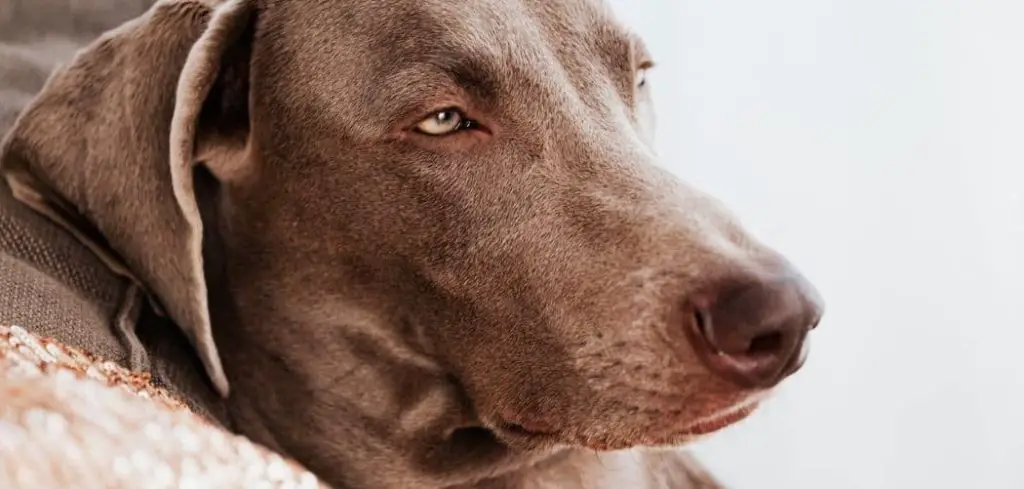When a dog is panting while just laying around, it can be alarming. Panting is a normal way for dogs to regulate their body temperature, but when it occurs in a dog that is inactive or seemingly resting, it may indicate an underlying medical condition.
We outline the common reasons why a dog may pant while just laying around, what you can do, and when to seek veterinary help.
Dog Panting and Just Laying Around — Why It Happens
Dog panting while just laying around often indicates discomfort, pain, or an underlying health issue rather than normal heat regulation. It can occur when a dog is feeling unwell from illness, fever, medication side effects, or internal pain such as joint, abdominal, or respiratory distress.
The panting is the body’s way of coping with stress or trying to cool down, even when the dog isn’t active.
Lethargy combined with panting can also point to more serious issues like heart or lung disease, dehydration, or hormonal imbalances.

Dog Panting and Just Laying Around: Common Causes
Heat Stress or Overheating
Even when resting, dogs can overheat and begin panting. Dogs with thick coats, brachycephalic breeds, or those in warm environments may struggle to cool down efficiently.
Signs include heavy panting, drooling, lethargy, and a warm body. Overheating can be dangerous and lead to heatstroke if not addressed promptly.
Read more: Dog Panting and Just Sitting Up (Why inactivity matters)
Anxiety or Stress
Panting while laying down can also signal anxiety or emotional stress. Dogs may become anxious due to changes in routine, loud noises, or separation from their owners.
Other signs may include pacing before resting, whining, trembling, or avoiding interaction. Reducing stressors and providing a safe environment can help ease anxiety-induced panting.
Pain or Discomfort
Pain is a common reason for panting while resting. Dogs suffering from arthritis, injuries, or internal discomfort may lie down and pant instead of moving around.
Watch for stiffness, reluctance to move, or changes in posture. Pain management and veterinary assessment are essential to prevent further complications and maintain quality of life.
Heart or Respiratory Issues
Heart disease or respiratory conditions can cause panting in dogs at rest. An underlying heart problem may reduce oxygen circulation, leading to labored breathing and fatigue.
Other symptoms can include coughing, weakness, and rapid heartbeat. These conditions require veterinary evaluation, as timely treatment can significantly improve outcomes.
Fever or Illness
Systemic illness or fever may cause dogs to pant while laying down. Infections, inflammation, or metabolic disorders can make a dog lethargic and prompt heavy panting.
Additional signs might include loss of appetite, vomiting, diarrhea, or general malaise. Veterinary intervention is necessary to diagnose and treat the underlying cause.
Obesity or Poor Physical Condition
Overweight dogs or those with low fitness levels may pant even while resting. Carrying extra weight puts more strain on the cardiovascular and respiratory systems, making it harder to maintain normal body temperature and energy.
Look for lethargy, difficulty moving, or shortness of breath during minimal activity. Weight management and regular low-impact exercise can help reduce resting panting over time.
What to Do If Your Dog Is Panting and Just Laying Around
Ensure your dog has access to a cool, shaded, and comfortable resting area. Avoid overheating by monitoring temperature and humidity.
Observe your dog’s behavior, noting when panting occurs and any additional symptoms like lethargy, whining, or restlessness. Keeping a record helps your veterinarian understand the situation.
Check for signs of pain, stiffness, or discomfort. Avoid forcing your dog to move if it seems reluctant, as this may exacerbate underlying issues.
Maintain hydration and provide fresh water. Offer light meals if your dog is willing to eat, as dehydration or low blood sugar can worsen panting.
Provide calm reassurance and minimize environmental stressors. Gentle petting, a quiet environment, and avoiding loud noises can help alleviate anxiety-related panting.
When to Call or Visit Your Vet
Immediate veterinary attention is warranted if you notice:
Persistent or worsening panting at rest
Difficulty breathing, coughing, or bluish gums
Signs of severe pain or distress
Lethargy that prevents normal movement
Loss of appetite or vomiting
Suspected heatstroke or exposure to toxins
Veterinarians can perform a comprehensive assessment including physical examination, blood tests, and imaging to diagnose heart, lung, or other medical issues contributing to panting while inactive.
Read more: Dog Panting and Jerking (Causes Explained)
Key Takeaway
Panting while just laying around in dogs can indicate heat stress, pain, anxiety, heart or respiratory problems, illness, or poor physical condition.
Observing your dog carefully, providing a comfortable resting environment, and seeking prompt veterinary care if symptoms persist is crucial.
Early detection and intervention help ensure your dog remains healthy, comfortable, and happy.
